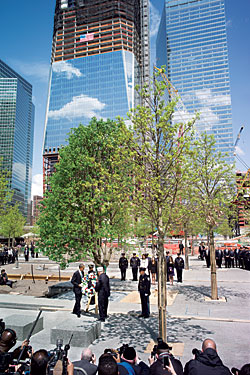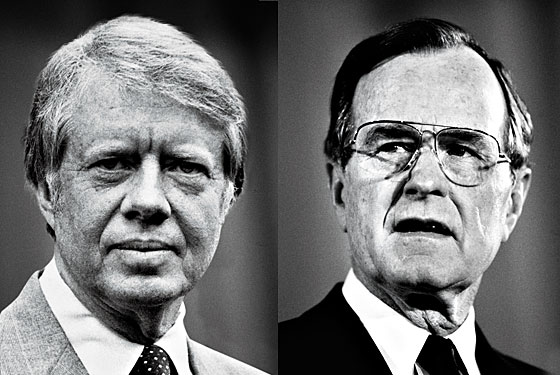
On the fourth day after the decade-long manhunt for Osama bin Laden had come to a bloody and triumphal end, Barack Obama made the trek from Washington to the place where it all began. After being deposited by helicopter in lower Manhattan, Obama took his motorcade to a midtown firehouse that lost fifteen men on 9/11; then back downtown to the First Precinct police station house in Tribeca, where he met with officers who had been among the first responders on that awful day; then to ground zero, where he laid a wreath at the “survivor tree,” a Callery pear planted in the World Trade Center complex more than 30 years ago that somehow withstood the wreckage of the attack; then to a closed-door session with some 60 family members of Osama’s victims; and then back to Washington, three hours after he’d touched down.
Until that morning, most had expected that Obama would deliver a rousing speech at ground zero, attempting to match or at least mirror George W. Bush’s bullhorn-wielding turn on September 14, 2001. Among those with this expectation, apparently, was Bush himself, who turned down Obama’s invitation to join him in New York. “[43] viewed this as an Obama victory lap,” a Bushworld source told Tom DeFrank of the Daily News, whose sources in that realm are stellar. “He doesn’t feel personally snubbed and appreciates the invitation, but Obama’s claiming all the credit and a lot of other people deserve some of it … It rubbed Bush the wrong way.”
Yet there was no Obama oration in Gotham, let alone any credit-hogging or victory-lapping. Instead, the president took pains to avoid perceptions that he was doing any such thing, opting for dignified restraint over dramatic flourishes, striking a somber tone—all with the goal of creating what his press secretary, Jay Carney, called a “sense of closure” and a “cathartic moment for the American people.”
Catharsis and closure are hard to measure or verify. For some people, those emotions surely came the moment Obama first announced that bin Laden had been killed; for others, sadly, they may never come. But whatever the effects of the death of OBL on the national psyche, there can be no doubt that it marked the end of a traumatic chapter in the annals of American policy and politics. Far less clear is whether it might also mean a new beginning for Obama.
Even after successfully completing the high-risk operation to zotz bin Laden, turning the page proved slightly more difficult than Obama might have expected—as the last few paragraphs provoked a pair of controversies, one utterly unnecessary and the other probably inevitable.
The former involved the administration’s account of the strike on Osama’s compound in Abbottabad, Pakistan, which over the course of the week underwent a significant, er, evolution. On Monday, the administration maintained that a cowardly Osama, in the midst of a heavy firefight, had been shooting from behind his wife, using her as a human shield. On Tuesday, whoops, came the admission that bin Laden was not armed and that his spouse had been no shield. On Wednesday, whoops again, the claims of a sustained firefight were retracted, too; the seals had been shot at only briefly, by one combatant, with four of the five people killed in the raid having been weaponless.
The fog of war is thick indeed—which is why the administration could and should have done itself a favor by offering its initial account of the operation with less certitude, fewer florid details, and more qualifying phrases. In America, to be sure, the errant, revised, and then re-revised narrative about what happened in the bin Laden compound matters precious little, and the fact that the target happened to be defenseless, even less so. (As Roger Ebert tweeted with perfect moral clarity, “Bin Laden was not armed when killed. Yeah, and neither was anyone in the World Trade Center.”) But in the Arab world, all of the backtracking has likely raised suspicions about the operation and U.S. credibility—needlessly so.
The second controversy, unfortunately, may have the same effect, although here the outcome was a matter of careful consideration and intense deliberation, as opposed to sloppiness. I am talking, of course, about the decision not to release an identifying photograph of a dead bin Laden—a head shot of a head shot, as it were.
The arguments on the other side were made most forcefully by the current CIA and future Pentagon chief Leon Panetta, who believed that putting out a photo was the only way to quash conspiracy theories that bin Laden is still alive. “We got bin Laden, and I think we have to reveal to the rest of the world the fact that we were able to get him and kill him,” Panetta told Brian Williams. On the other side were Hillary Clinton and Bob Gates, who feared that releasing a photo would spark a backlash where one didn’t seem to yet exist, in the process putting American troops or civilians at (greater) risk of reprisals.

In the end, that concern was dispositive for Obama. “It’s important to make sure that very graphic photos of somebody who was shot in the head are not floating around as an incitement to additional violence or as a propaganda tool,” he told Steve Kroft of 60 Minutes. “We don’t need to spike the football.”
A tough call, no doubt, but I suspect that the president is right. True, the fact that conspiracy theories will now surely thrive in some quarters (mainly, again, in the Arab world) is regrettable. Also true, as Obama’s release of his long-form birth certificate shows, he is not immune to capitulating to the freak show when it serves his purposes. But there is a vast difference between such capitulation when the only potential price is your pride and when doing so could put people in harm’s way. Especially when hard-core proofers, like hard-core birthers and hard-core truthers, gaze upon any piece of visual evidence and think only one thing: Photoshop!
For some conservatives, the photo controversy has been one of a handful of very slender reeds to grasp onto in this time of outsize Obaman attainment. (He cares more about Muslim anger than American exultation.) Another is the battle over credit: that Bush deserves as much as or more than Obama. And still another is Panetta’s acknowledgment that some of the intelligence used to track bin Laden came from detainees subject to enhanced interrogation. (RedState Morning Briefing headline: “Waterboarding Worked.”) Put aside the merits of the arguments here, which could fill an entire column. Instead simply note the sheer desperation that is fueling them, the frantic efforts on the right to re-spin a situation that is, for the moment, already fully spun—in a direction that scares the GOP fairly senseless.
And with good reason. Before deep-sixing bin Laden, Obama was looking increasingly shaky politically, his approval ratings sliding, the percentage of voters saying the nation is on the wrong track hovering close to 70. He looks a lot more solid now. Barring a terrorist event on domestic soil for which he is blamed, his national-security credentials will be difficult to challenge. The perception of him as a strong and competent leader is bound to soar. In one fell swoop, he has consigned to the dustbin the Republican caricature of him as a feckless, dithering, weak-kneed law professor. The meme of Obama as Jimmy Carter redux is no more.
But now Obama must confront (and avoid) the possibility of a new meme: being cast as George Herbert Walker Bush, the sequel. Recall, please, that back in 1991, after winning the first Gulf War, 41’s approval rating skyrocketed to 89 percent. And what did he do with all that love? He sat back, put his feet up, and basked in it, coasting into the jaws of a bad economy—only to find himself beaten in his reelection bid by the philandering, draft-dodging, dope-smoking governor of a small, poor, obscure southern state.
Now, you might point out that none of the actual or potential Republicans in the 2012 field has anything like the chops of William Jefferson Clinton. Indeed, of the five candidates who appeared at the first Republican presidential debate of the year in South Carolina last week—Herman Cain, Gary Johnson, Ron Paul, Tim Pawlenty, Rick Santorum—there wasn’t even a Republican Paul Tsongas in the room. Taking a gander at this motley crew, it will be sorely tempting for Obama to recline on his OBL-spawned laurels and play it serenely safe in the months ahead.
Tempting, but potentially disastrous. If the economy remains in the state it’s in today come Labor Day next year, the ending of bin Laden will be all but forgotten as a salient voting issue, and Obama will be vulnerable, more vulnerable than he would find plausible, or even imaginable, today.
And so Obama must resist the desire to click on the cruise control. He must seek to capitalize on the moment that OBL’s demise has granted him, in which he once again has the stature and political capital available to do big things. With the economy largely out of his control at this juncture, the two most obvious areas where boldness is possible are the budget (leading the way to a grand bargain on deficit reduction and entitlement and tax reform) and Afghanistan (leading our troops home). Both would require him to take considerable risks. But if there’s anything that Obama should have learned from this past extraordinary and exhilarating week, it’s that with big risks come big rewards.
E-mail: jheilemann@gmail.com.